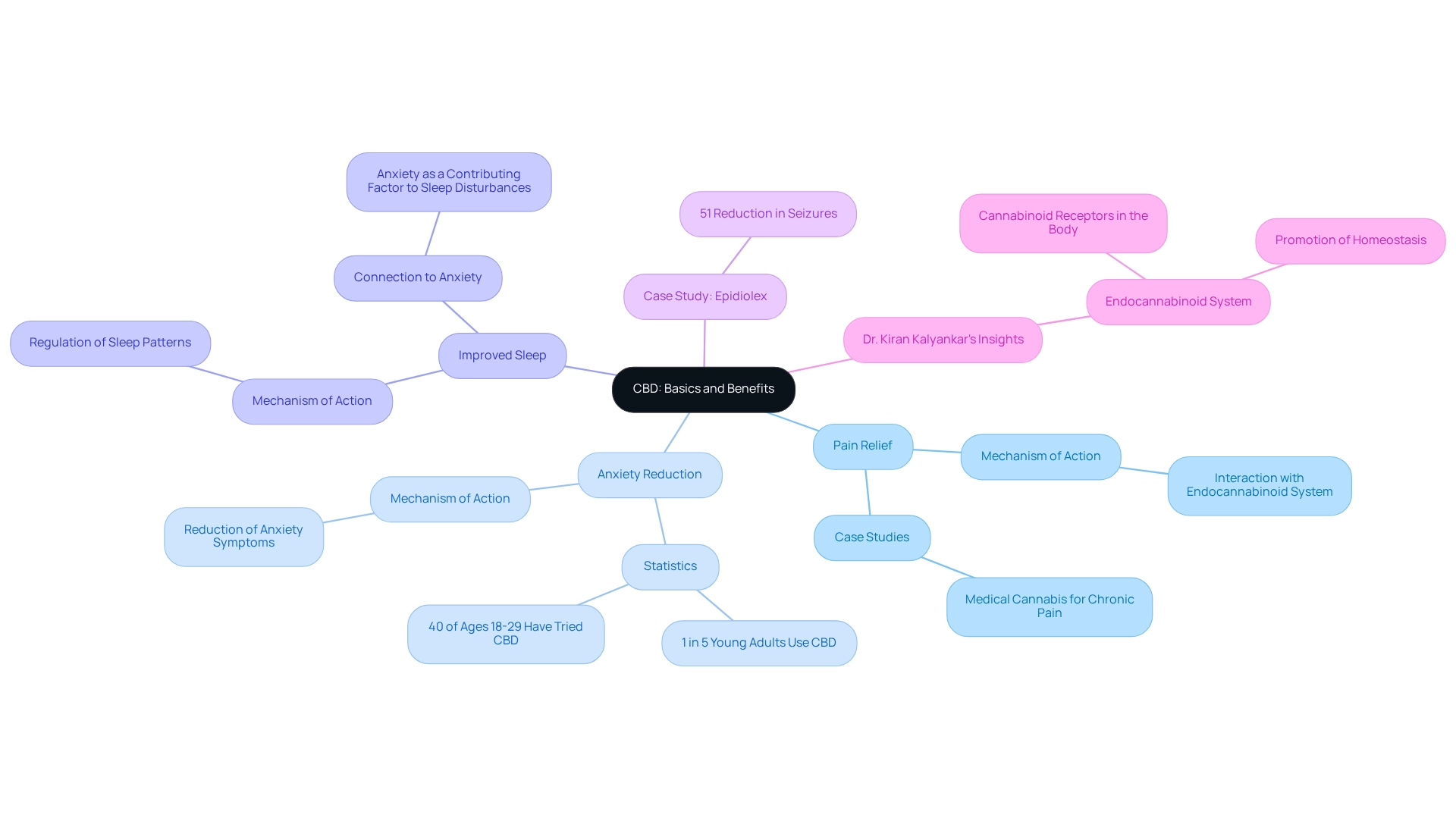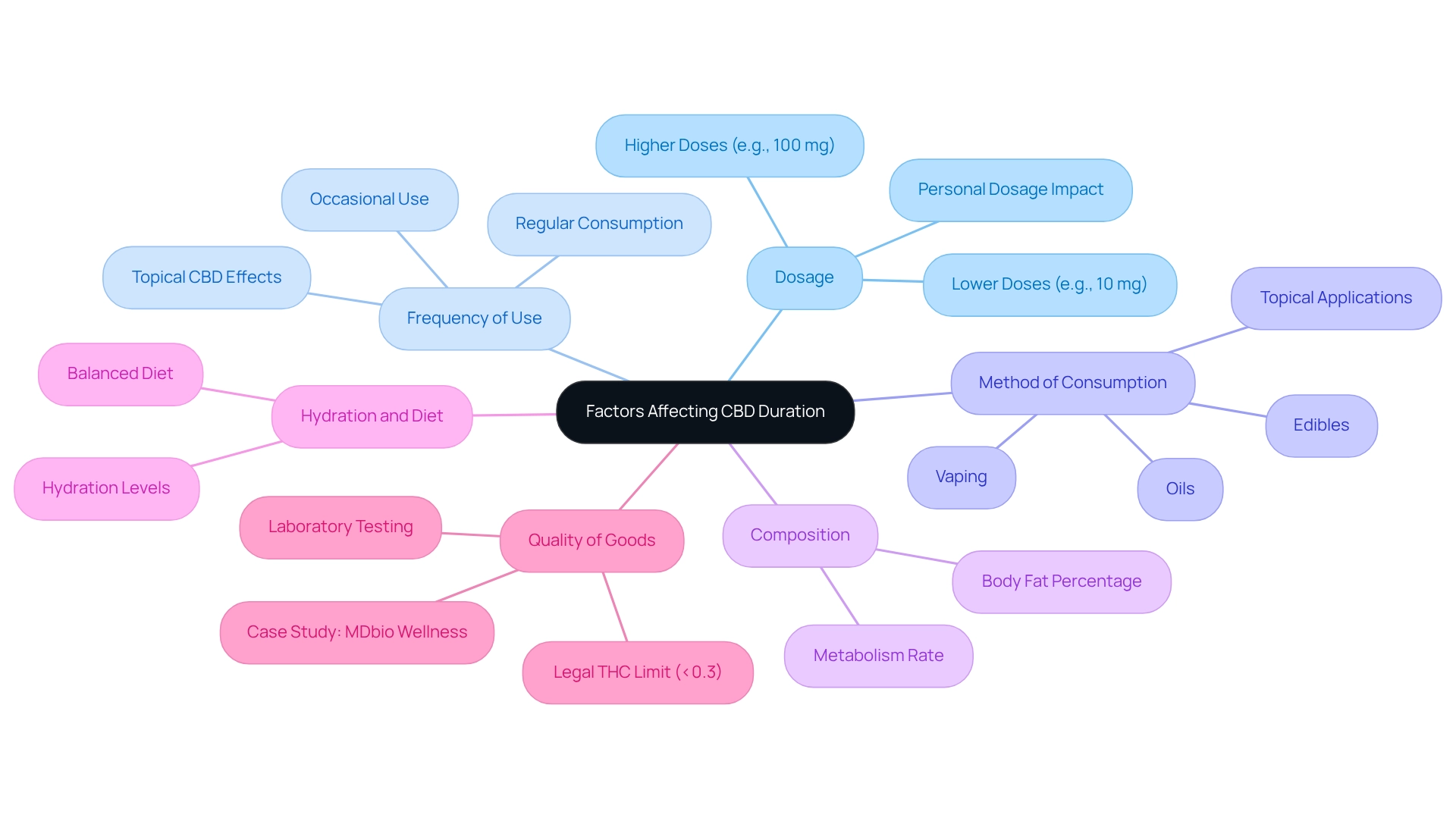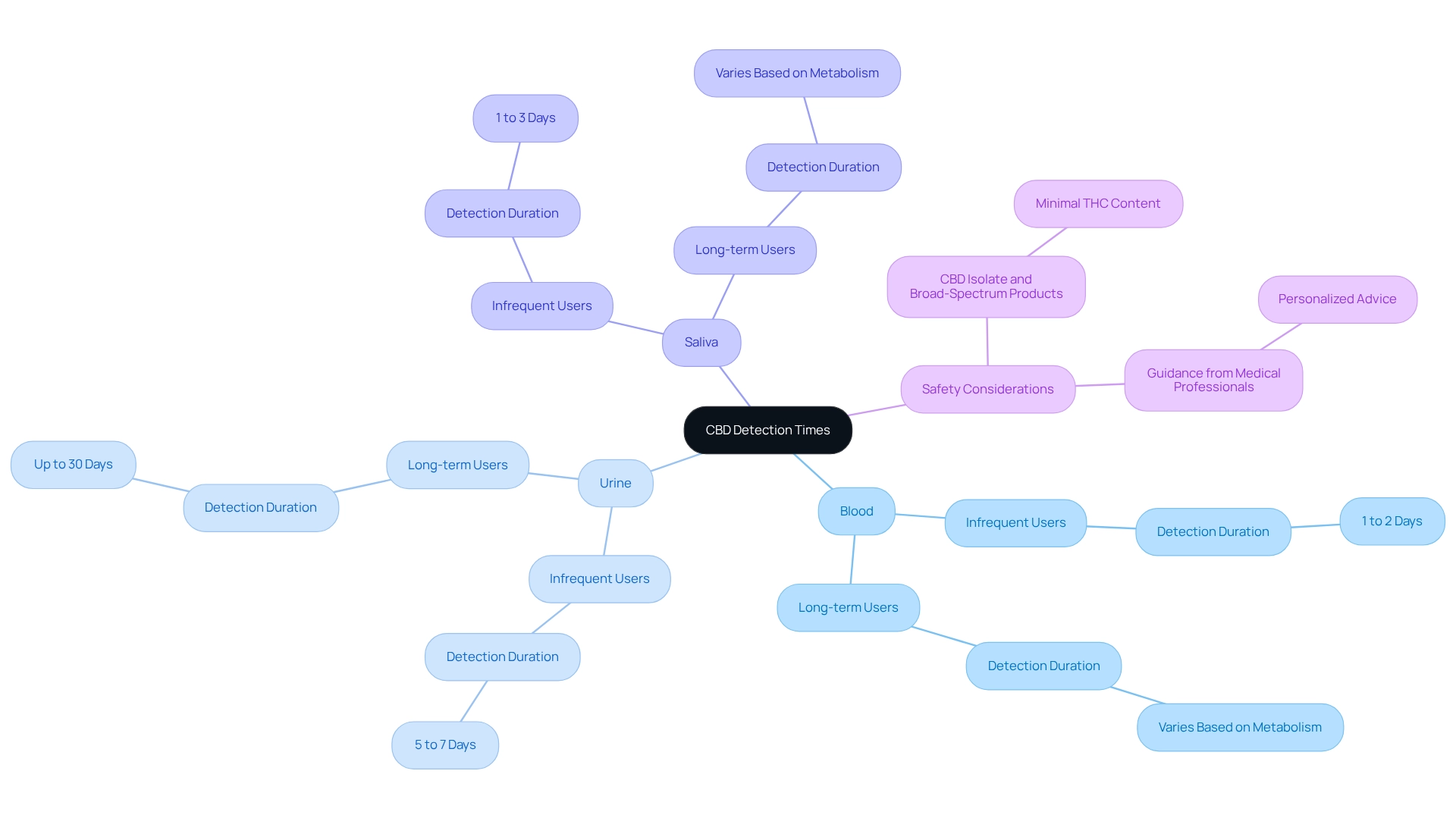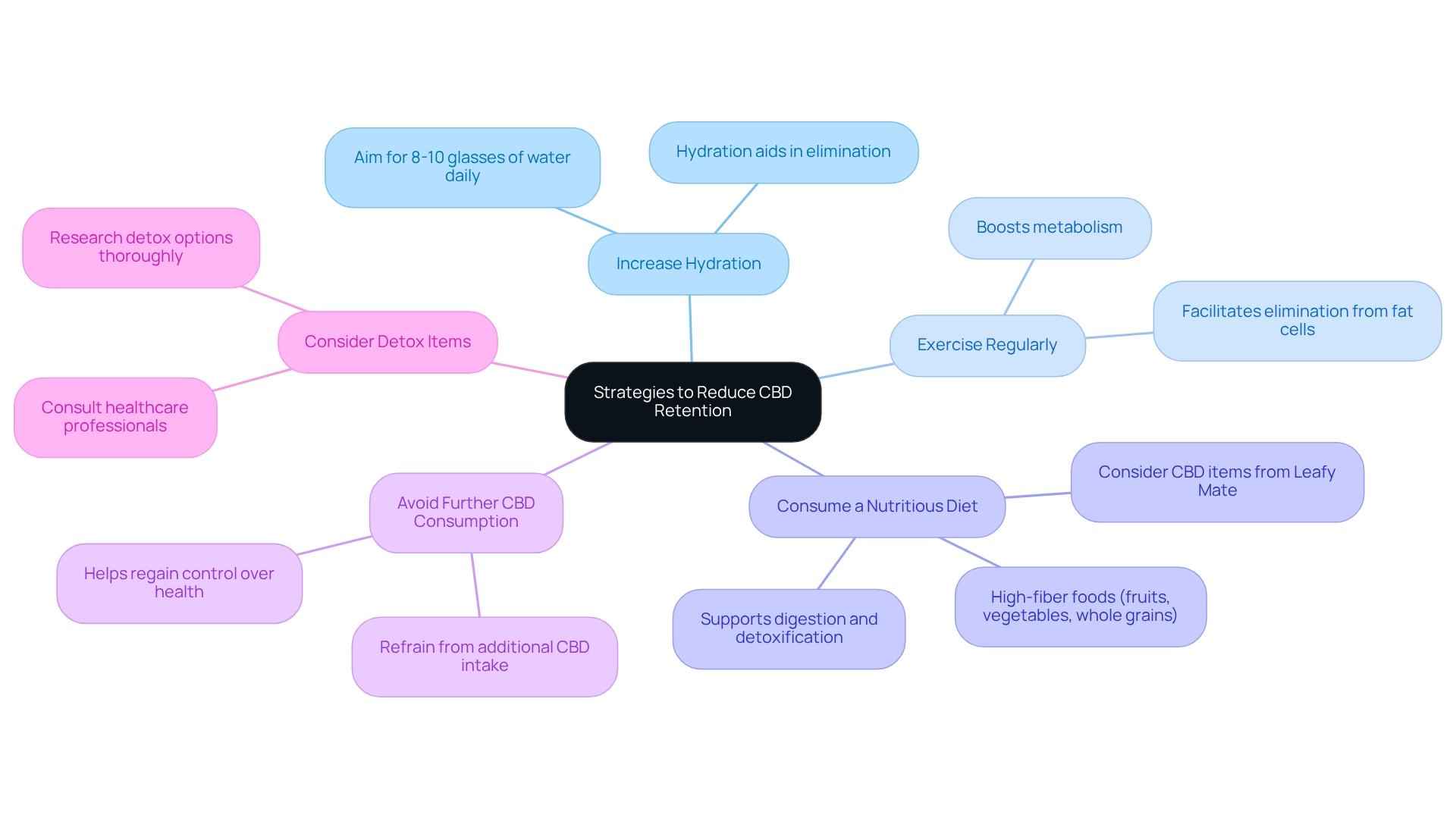Overview
CBD typically stays in your system for 1 to 30 days. This range can depend on several factors, including:
- Dosage
- Frequency of use
- Method of consumption
- Individual metabolism
Have you ever wondered how these elements might affect you personally? Higher doses and regular use can lead to longer retention times. This highlights the importance of understanding your own habits and body composition.
As we navigate our choices together, it’s essential to consider how these factors play a role in managing CBD’s presence in our bodies. By being aware of your personal habits, you can make informed decisions that align with your health and wellness journey. Let’s explore this topic further and empower ourselves with knowledge.
Introduction
In recent years, cannabidiol (CBD) has emerged as a beacon of hope for many seeking natural relief from a myriad of health issues. Have you ever felt overwhelmed by anxiety, chronic pain, or sleep disorders? Unlike its more infamous counterpart, THC, CBD offers therapeutic benefits without the psychoactive effects, making it an appealing choice for individuals like you who are looking for effective solutions.
As the popularity of CBD continues to soar, understanding its fundamental benefits and the factors that influence its retention in the body becomes crucial for users. Together, we can explore the intricacies of dosage and consumption methods, as well as the nuances of detection in various bodily fluids.
This article delves into the essential aspects of CBD that every user should know. Whether you are navigating the complexities of drug testing or simply aiming to optimize your wellness journey, you will gain valuable insights into the world of CBD and its potential impact on your health.
Understand CBD: Basics and Benefits
Cannabidiol (CBD) is a non-psychoactive compound derived from cannabis plants, celebrated for its potential therapeutic benefits. Unlike THC, CBD does not induce a ‘high,’ making it a preferred option for those seeking relief from various ailments. Many individuals turn to CBD for its anti-inflammatory, analgesic, and anxiolytic properties, particularly for conditions such as anxiety, chronic pain, and sleep disorders. Understanding how long does CBD stay in your system is essential, especially for those who are concerned about drug testing or health implications.
Key Benefits of CBD:
- Pain Relief: CBD interacts with the endocannabinoid system, effectively reducing pain and inflammation. This interaction is particularly beneficial for individuals suffering from chronic pain conditions. Additionally, medical cannabis has been shown to alleviate symptoms of other medical conditions such as multiple sclerosis and nausea associated with chemotherapy, offering a holistic approach to healthcare.
- Anxiety Reduction: Many individuals report decreased anxiety levels after using CBD, making it a popular option for those with anxiety disorders. In fact, recent statistics indicate that 1 in 5 young adults between 18 and 29 years use CBD, reflecting its growing acceptance among younger demographics. How might this resonate with your own experiences?
- Improved Sleep: CBD may assist in regulating sleep patterns, offering relief for those struggling with insomnia. This aspect is increasingly relevant as more people seek natural alternatives to improve their sleep quality. Research suggests that CBD can help reduce anxiety, which is often a contributing factor to sleep disturbances.
The therapeutic potential of CBD is further underscored by case studies, such as the FDA-approved Epidiolex, which has demonstrated a 51% reduction in seizures among users. This statistic not only highlights CBD’s medical efficacy but also reinforces its legitimacy in the healthcare sector. As Dr. Kiran Kalyankar states, “Now one may ask, why is cannabis so effective? The answer is enciphered within us. Our organism contains the Endocannabinoid system, which is a biological system full of cannabinoid receptors that reside within the brain, organs, connective tissue, glands, and immune cells.” By understanding these fundamental benefits, we can better appreciate how long does CBD stay in your system and its broader implications for health and wellness. Together, let’s explore how CBD can support our journey towards improved well-being.
Identify Factors Affecting CBD Duration in Your Body
Several factors can significantly influence how long CBD stays in your system, such as dosage, since the amount of CBD consumed plays a crucial role in retention time. Higher doses, such as 100 mg, can lead to longer detection periods compared to lower doses like 10 mg. This relationship underscores the importance of understanding personal dosage impacts. It is advised that crossover studies involving CBD should, therefore, be carried out with care, especially when higher doses and/or long-term dosing schedules are utilized (Doctor Simon Erridge).
- Frequency of Use: Have you considered how often you use CBD? Regular consumption can lead to CBD buildup within the system, extending its detectable duration. Users who incorporate CBD into their daily routine may notice different effects compared to occasional users, especially when considering the soothing benefits of topical CBD products.
- Method of Consumption: The method by which CBD is ingested—whether through oils, edibles, or vaping—affects its absorption and metabolism. For instance, edibles typically take longer to metabolize than oils, which influences how long CBD stays in your system. Topical applications may offer prompt relief, but their systemic effects can differ.
- Composition: Individual factors such as fat percentage and overall metabolism can influence the processing and elimination of CBD. Those with higher body fat may retain CBD longer due to its lipophilic nature, which is particularly relevant for those exploring cannabis tinctures for enhanced wellness.
- Hydration and Diet: Are you staying hydrated and maintaining a balanced diet? Adequate hydration and a balanced diet can enhance metabolic rates, potentially aiding in the quicker elimination of CBD from the body. This is essential for individuals aiming to optimize the advantages of their CBD routine.
- Quality of Goods: The legal stipulation for full-spectrum CBD to have less than 0.3 percent THC is vital when evaluating the quality of goods. A case study highlighted that individuals using high-quality CBD items, which are rigorously tested for contaminants, reported more consistent effects and retention times. This highlights the significance of product quality in the overall experience, especially for individuals seeking pain relief through CBD.
Comprehending these factors enables us to customize our CBD intake effectively, ensuring we can control our experiences and expectations concerning its duration in our system. Together, let’s explore how these insights can enhance your CBD journey.
Explore CBD Detection Times in Blood, Urine, and Saliva
CBD can be detected in various bodily fluids, so understanding how long does CBD stay in your system is essential for users, especially those facing drug testing or health assessments. Let’s explore this together:
- Blood: Typically, CBD remains detectable in blood for 1 to 2 days post-consumption. However, this duration can fluctuate based on individual metabolism and the amount consumed, raising the question of how long does CBD stay in your system.
- Urine: In urine tests, CBD may be detectable for up to 5 to 7 days for infrequent users. For those who use CBD long-term, it might be detectable for longer durations, possibly extending up to 30 days, which raises the question of how long does CBD stay in your system.
- Saliva: Saliva tests can identify CBD for approximately 1 to 3 days after use, although individual metabolic rates and consumption habits can influence this timeframe.
Recent findings suggest that CBD isolate and broad-spectrum CBD alternatives are the safest choices for preventing drug test complications, as they usually have minimal THC. While CBD itself may not result in a positive drug test, it raises the question of how long does CBD stay in your system, especially since the presence of THC in full-spectrum products can lead to detection. This is important to consider, isn’t it?
At Leafy Mate, we understand the significance of selecting products designed with patient safety in mind. We connect individuals to a wide range of trusted medical marijuana doctors who can offer personalized guidance concerning CBD use and drug testing. As Babak Larian mentions, ‘Our offerings arise from our Board-Certified Medical Doctors, whose lifelong mission throughout their careers has been to maximize positive patient outcomes and minimize harm.’ This commitment to quality ensures that you can trust the cannabis products you choose.
For further education and personalized advice regarding CBD use and drug testing, we invite you to book a free nurse call through Leafy Mate. As the cannabis landscape evolves, it is essential to stay informed about how long does CBD stay in your system for responsible use. Together, we can navigate this journey with care.
Implement Strategies to Reduce CBD Retention in Your System
To effectively reduce the retention time of CBD in your system, let’s explore some compassionate strategies together:
- Increase Hydration: Staying well-hydrated is crucial for your well-being. Aim for at least 8-10 glasses of water daily, as this can help flush CBD from your system more efficiently. Remember, hydration plays a significant role in the elimination process, especially since a faster metabolism can lead to quicker processing of CBD.
- Exercise Regularly: Engaging in physical activity is not only beneficial for your body but also boosts your metabolism, facilitating the elimination of CBD stored in fat cells. Consistent exercise can greatly improve your system’s processing abilities, making it easier to manage your CBD levels.
- Consume a Nutritious Diet: A diet rich in high-fiber foods, such as fruits, vegetables, and whole grains, supports digestion and encourages the elimination of CBD from your system. Various studies suggest that dietary changes can assist in detoxification, helping to remove substances like CBD. Additionally, incorporating CBD items from Leafy Mate can enhance your wellness journey, providing soothing benefits that complement a healthy lifestyle.
- Avoid Further CBD Consumption: To expedite the elimination process, consider refraining from consuming additional CBD until the compound is fully cleared from your system. This approach can help you feel more in control of your health.
- Consider Detox Items: While some users explore detox options that claim to cleanse the body of cannabinoids, it’s essential to research these choices thoroughly and consult with a healthcare professional before use. Your health is paramount, and informed decisions are key, particularly regarding how long does CBD stay in your system, as its retention time can vary greatly among individuals based on factors such as dosage, frequency of use, individual metabolism, weight, overall health, age, and gender.
By adopting these strategies, you can effectively manage your CBD levels, ensuring you feel prepared for any upcoming drug tests or health evaluations. Additionally, maintaining a faster metabolism can lead to quicker processing of CBD, further aiding in its elimination. For those looking to explore and purchase CBD oil products, Leafy Mate offers a comprehensive platform to find suitable options tailored to your needs. Together, we can navigate this journey towards better health.
Conclusion
Cannabidiol (CBD) emerges as a promising natural remedy for various health concerns, offering benefits such as pain relief, anxiety reduction, and improved sleep quality. Its non-psychoactive nature makes it an appealing option for those seeking therapeutic effects without the high associated with THC. Understanding the fundamental advantages of CBD is vital for users, especially regarding dosage and consumption methods that can influence its retention in the body.
The duration that CBD remains detectable in the body is shaped by several factors, including:
- Dosage
- Frequency of use
- Method of consumption
- Body composition
- Product quality
By recognizing these variables, we can better tailor our CBD intake to meet our health goals while managing potential drug testing concerns. Additionally, being aware of CBD detection times in bodily fluids such as blood, urine, and saliva is crucial for individuals who may be subject to drug testing.
Implementing strategies to reduce CBD retention—such as increasing hydration, exercising regularly, and maintaining a healthy diet—can enhance our body’s ability to process and eliminate the compound efficiently. By taking informed steps together, we can optimize our CBD experience and ensure we are prepared for any health evaluations. Ultimately, knowledge is power in the evolving landscape of CBD use, enabling us to make choices that align with our wellness journeys and lifestyle needs.
Frequently Asked Questions
What is cannabidiol (CBD)?
Cannabidiol (CBD) is a non-psychoactive compound derived from cannabis plants, known for its potential therapeutic benefits. Unlike THC, CBD does not produce a ‘high,’ making it a popular choice for individuals seeking relief from various ailments.
What are the key benefits of CBD?
The key benefits of CBD include pain relief, anxiety reduction, and improved sleep. It interacts with the endocannabinoid system to reduce pain and inflammation, helps decrease anxiety levels for individuals with anxiety disorders, and assists in regulating sleep patterns, which can aid those struggling with insomnia.
How does CBD help with pain relief?
CBD interacts with the endocannabinoid system, effectively reducing pain and inflammation. This interaction is particularly beneficial for individuals suffering from chronic pain conditions and can also alleviate symptoms of other medical conditions, such as multiple sclerosis and chemotherapy-induced nausea.
Can CBD help reduce anxiety?
Yes, many individuals report decreased anxiety levels after using CBD. It has become a popular option for those with anxiety disorders, with statistics showing that 1 in 5 young adults between 18 and 29 years use CBD, indicating its growing acceptance among younger demographics.
How does CBD affect sleep?
CBD may assist in regulating sleep patterns, providing relief for those experiencing insomnia. It can help reduce anxiety, which is often a contributing factor to sleep disturbances, thus improving sleep quality.
What evidence supports the therapeutic potential of CBD?
The therapeutic potential of CBD is highlighted by case studies, such as the FDA-approved Epidiolex, which has shown a 51% reduction in seizures among users. This demonstrates CBD’s medical efficacy and reinforces its legitimacy in the healthcare sector.
What is the endocannabinoid system and its relevance to CBD?
The endocannabinoid system is a biological system within our bodies that contains cannabinoid receptors located in the brain, organs, connective tissue, glands, and immune cells. It plays a crucial role in how CBD interacts with the body, contributing to its therapeutic effects.
Get Your Medical Card
Connect with a licensed physician online in minutes
















